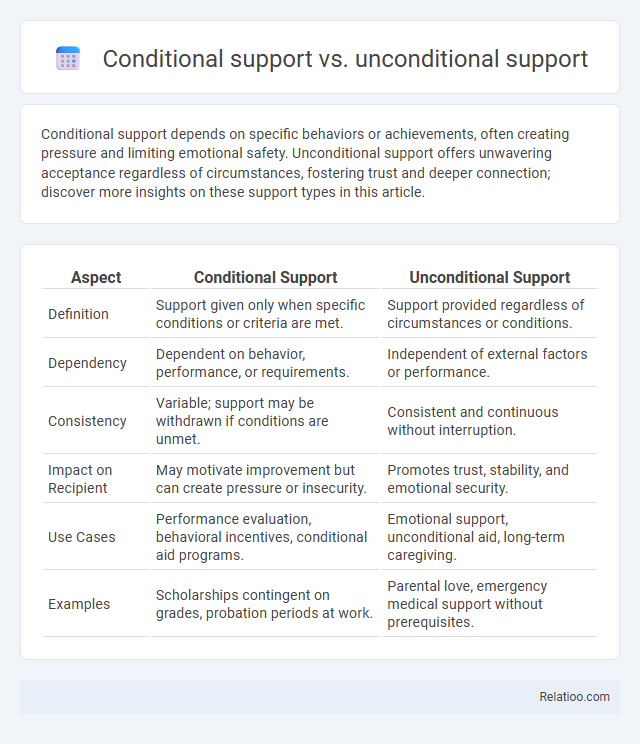Conditional support depends on specific behaviors or achievements, often creating pressure and limiting emotional safety. Unconditional support offers unwavering acceptance regardless of circumstances, fostering trust and deeper connection; discover more insights on these support types in this article.
Table of Comparison
| Aspect | Conditional Support | Unconditional Support |
|---|---|---|
| Definition | Support given only when specific conditions or criteria are met. | Support provided regardless of circumstances or conditions. |
| Dependency | Dependent on behavior, performance, or requirements. | Independent of external factors or performance. |
| Consistency | Variable; support may be withdrawn if conditions are unmet. | Consistent and continuous without interruption. |
| Impact on Recipient | May motivate improvement but can create pressure or insecurity. | Promotes trust, stability, and emotional security. |
| Use Cases | Performance evaluation, behavioral incentives, conditional aid programs. | Emotional support, unconditional aid, long-term caregiving. |
| Examples | Scholarships contingent on grades, probation periods at work. | Parental love, emergency medical support without prerequisites. |
Understanding Conditional and Unconditional Support
Conditional support depends on specific criteria being met, typically tied to certain behaviors or achievements, while unconditional support is given without any prerequisites, reflecting unwavering commitment. Understanding the difference helps you navigate relationships and expectations more effectively by recognizing when support is based on conditions versus inherent acceptance. Emphasizing unconditional support fosters trust and security, promoting deeper emotional connections.
Key Differences Between Conditional and Unconditional Support
Conditional support relies on specific terms or behaviors for assistance to continue, whereas unconditional support is given without any prerequisites or expectations. Unconditional support means unwavering backing regardless of circumstances, directly fostering a sense of security and trust in Your relationships or endeavors. The key differences lie in the presence of conditions and the emotional impact each type of support carries on personal and professional dynamics.
Psychological Foundations of Support Types
Conditional support hinges on specific behaviors or achievements, reinforcing motivation through clear expectations rooted in operant conditioning principles. Unconditional support provides constant acceptance regardless of outcomes, fostering secure attachment and emotional resilience based on attachment theory. Purely unconditional support emphasizes intrinsic value over performance, promoting self-worth and psychological safety essential for healthy development.
Effects of Conditional Support on Relationships
Conditional support shapes relationships by creating expectations tied to specific behaviors or achievements, often leading to stress and decreased emotional security. Your sense of trust may weaken as support fluctuates based on meeting conditions, causing potential distance or conflict. In contrast, unconditional support fosters stable bonds by offering acceptance regardless of circumstances, promoting resilience and open communication.
Benefits of Unconditional Support in Personal Growth
Unconditional support fosters a safe environment where individuals feel valued regardless of their mistakes, promoting resilience and self-confidence essential for personal growth. It enables authentic self-expression and risk-taking without fear of judgment, accelerating emotional healing and development. Unlike conditional support, which may create pressure to meet expectations, unconditional support cultivates intrinsic motivation and a deeper sense of self-worth.
Potential Risks of Unconditional Support
Unconditional support can pose risks such as enabling harmful behaviors, fostering dependency, and preventing personal accountability or growth. Unlike conditional support, which requires meeting specific criteria to encourage positive change, unconditional support may inadvertently shield individuals from facing the consequences of their actions. Understanding these potential risks helps you balance empathy with promoting responsibility.
When Conditional Support Might Be Necessary
Conditional support becomes necessary when specific criteria or behaviors must be met to ensure accountability and progress, such as in academic or therapeutic settings. Unconditional support offers unwavering encouragement regardless of circumstances, fostering emotional security and trust. Your choice between these types depends on whether the goal is promoting growth through expectations or providing stable, consistent reassurance.
Cultivating Healthy Boundaries in Support
Conditional support requires specific criteria to be met, which can help establish clear expectations and reinforce healthy boundaries by preventing codependency. Unconditional support offers unwavering acceptance regardless of circumstances, promoting emotional security but potentially risking boundary violations if limits are not maintained. Balancing unconditional support with well-defined boundaries ensures compassion without enabling, fostering mutual respect and personal growth in relationships.
Signs of Manipulation in Support Dynamics
Conditional support often signals manipulation when assistance hinges on specific behaviors or compliance, creating pressure to conform. Unconditional support fosters trust and autonomy, but if exploited, it can mask control by feigning generosity without genuine empathy. Observing shifts in consistency, emotional responses, and demands reveals manipulation patterns within support dynamics.
Strategies for Balancing Conditional and Unconditional Support
Strategies for balancing conditional and unconditional support involve clearly defining boundaries while maintaining empathy to foster trust and growth. You can implement conditional support by setting specific expectations that encourage accountability, paired with unconditional support to provide emotional stability regardless of outcomes. Combining these approaches helps create a supportive environment where individuals feel valued and motivated to achieve their best.

Infographic: Conditional support vs Unconditional support
 relatioo.com
relatioo.com